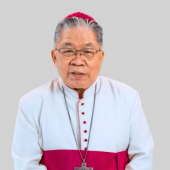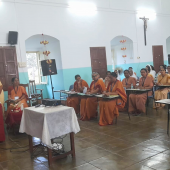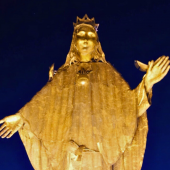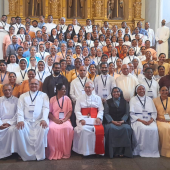Bible Month Makes Word Come Alive for Indonesians

Every September, Saputri Sapta, a parishioner of the Cathedral of the Holy Spirit in Denpasar, Bali, the capital city of Bali Province, Indonesia, carries out a special mission: to read the Bible daily, reflect on it, and pray.
In Indonesia, the Catholic bishops have designated September as “Bible Month,” encouraging all Catholics across the archipelago to do the same as Sapta, a mother of four adult children.
“Our Christian life must be based on Scripture,” she says. “Without reading, reflecting, and praying with Scripture, life is incomplete and hollow. God speaks to us in and through His Word. We need to read and meditate on the Word of God not only in September, but every month, every day. For me, the Word of God is the compass of my life. It is strength, inspiration, and a source of grace.”
The Indonesian Catholic Church began celebrating the National Bible Month, also known as Bulan Kitab Suci Nasional (BKSN), in 1977, replacing a single Bible Sunday. The initiative promotes month-long Bible-related events such as quizzes, group discussions, and special liturgies, helping Catholics grow in faith and deepen their understanding of Scripture.
BKSN was inspired by the Second Vatican Council (1962–1965), particularly the document Dei Verbum (Word of God), which reshaped the Church’s view of Scripture in the modern world and encouraged the faithful to read the Bible earnestly.
In 1975, an ecumenical translation of the Bible was published through a joint effort of the Indonesian Biblical Institute, under the Bishops’ Council, and the Indonesian Bible Institute, representing the Communion of Churches in Indonesia. Two years later, the bishops designated the first Sunday of September as National Scripture Sunday. By 1978, as one day felt too short to quench the thirst of people for the Word, this was expanded to an entire month, giving rise to what is now known as National Bible Month.
This year, from July 15–19, representatives of dioceses and institutions gathered at the Catholic Center in Denpasar, Bali, for the National Meeting of Indonesian Biblical Institutes. The event, themed “Proclaiming Christ in the Asian and Indonesian Context,” focused on advancing the Apostolate of Scripture. Participants included diocesan delegates, heads of diocesan Scripture commissions, and representatives from institutions dedicated to Biblical studies and ministry.
According to Fr. Aloysius Budipurnomo from the Archdiocese of Semarang, “Catholic families are not supposed to keep the Bible on a shelf, forgotten and unread. The Church urges everyone to read the Bible daily and study it to live an authentic Christian life and witness it faithfully.”
The observance of Bible Month aims to raise awareness among families of the importance of Scripture in daily life. It is meant to instill in Catholics a deep love and respect for the Bible, not only among priests, nuns, and religious, but also among lay Catholics, movements, and organizations throughout Indonesia.
During the month, Catholics across the country engage in Bible reading, reflection, and analysis, drawing lessons for today’s context. Priests also prepare daily reflections on the liturgy, shared widely through social media and online platforms.
Fr. Budipurnomo, who has been sharing reflections for years, says the response has been encouraging. Another priest, Fr. Noegroho Agoeng, shares meditations drawn from people’s lived experiences and daily realities. In the Diocese of Purwokerto, Fr. Agustinus Dwiyantoro promotes recreational activities linked to Bible reading and meditation.
Catholic bishops commend the efforts of priests, nuns, and laypeople who bring Bible Month alive in creative and meaningful ways, strengthening the spiritual lives of the faithful through readings, reflections, and meditations on the Word of God.
Radio Veritas Asia (RVA), a media platform of the Catholic Church, aims to share Christ. RVA started in 1969 as a continental Catholic radio station to serve Asian countries in their respective local language, thus earning the tag “the Voice of Asian Christianity.” Responding to the emerging context, RVA embraced media platforms to connect with the global Asian audience via its 21 language websites and various social media platforms.














